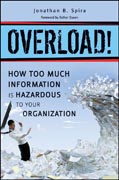
Overload!: how too much information is hazardous to your organization
Spira, Jonathan B.
Timely advice for getting a grip on information overload in the workplace This groundbreaking book reveals how different kinds of information overload impact workers and businesses as a whole. It helps businesses get a grip on the financial and human costs of e-mail overload and interruptions and details how working in an information overloaded environment impacts employee productivity,efficiency, and morale. Explains how information—often in the form of e-mail messages, reports, news, Web sites, RSS feeds, blogs, wikis, instant messages,text messages, Twitter, and video conferencing walls—bombards and dulls our senses Explores what we do with information Documents how we created more and more information over centuries Reveals what all this information is doing Timely and thought-provoking, Overload! addresses the reality of—and solutions for—a problem to which no one is immune. INDICE: Foreword. Preface. Acknowledgments. Introduction. How We Got Here.The Age of the Knowledge Worker. Mark Rivington's Day. A Global Economy. PartI: How We Got Here. Chapter 1: Information, Please? Chapter 2: History of Information. The Information Revolution and the Book. eReaders Rising. After the BookGetting the Word Out. The New News Cycle. Chapter 3: Welcome to the Information Age. Is Software Holding Us Back? The Tools We Use. Mid-Nineteenth Century Tools: Groundwork is Laid. Twentieth-Century Tools: The Foundation for the Information Revolution. Breakthroughs in Productivity. Online Collaboration Makes Its Entrance. Enter Charlie Chaplin. Enter the Office Suite. An Office forthe Twenty-First Century. The Problem of Too Much of a Good Thing. The Collaborative Business Environment. Chapter 4: What Is Information? Quantifying Information. Why Information Is Exploding. How Information Is Going beyond Networkand Storage Capabilities. Structured Information versus Unstructured. Data Mining to the Rescue? Chapter 5: The Information Consumer. Chapter 6: What Is Information Overload? Meetings: Too Much of a Good Thing? How Long Has This BeenGoing On? More Information Isn't that What We Wanted? Information Overload and the Tragedy of the Commons. The Ephemerization of Information. Chapter 7: The Cost of Information Overload. Chapter 8: What Hath Information Overload Wrought? Aspects of Information Overload. Information Overload-related Maladies. Chapter 9: The Two Freds. Entitlement. Mad about Information. Work-life Balance. Chapter 10: Beep. Beep. Beep. How Much Texting is Too Much? Sample Text Phraseology. The Search for Whatever It Is We Are Looking For. Chapter 11: Headingfor a Nervous Breakdown. Thinking for a Living. The Roundtable. How the OtherHalf Lives. The New Busy Is Heading for a Nervous Breakdown. Part II: Where We Are and Where We Are Going. Chapter 12: Managing Work and Workers in the Twenty-First Century. Chapter 13: Components of Information Overload. E-mail Overload. Unnecessary Interruptions and Recovery Time. Need for Instant Gratification. Everything is Urgent and Important. Chapter 14: E-mail. The Cost of Too Much E-mail. E-mail and the Network Effect. Reply-to-All. Get Rid of Reply-To-All? Profanity in E-mail (Expletive Deleted). A Day without E-mail. What to Do With 2.5 Billion E-mails. Deleting E-mail, Deleting Knowledge. Chapter 15: TheGooglification of Search. Does the King of the Watusis Drive an Automobile? Chapter 16: Singletasking. Attention. Three Types of Attention. Automaticity. The Supertaskers among Us. Chapter 17: Intel's War on IO. Recent Information Overload Initiatives. Quiet Time: A Time for Thought and Reflection. No E-Mail Day. E-mail Service Level Agreement. Chapter 18: Government Information Overload. The Government's Informatio
- ISBN: 978-0-470-87960-3
- Editorial: John Wiley & Sons
- Encuadernacion: Cartoné
- Páginas: 256
- Fecha Publicación: 11/05/2011
- Nº Volúmenes: 1
- Idioma: Inglés
